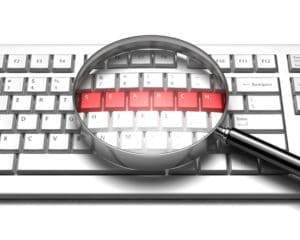There are four situations where the police can search your data and files.
In 2017, most people no longer rely on old-fashioned filing cabinets to store our personal information. Instead, most of us store our most important documents on our computers. This leaves many people wondering just how secure their information is — not just from hackers, but from the police. With the increase in the amount of information stored on our personal computers, many Californians may be wondering when exactly the police can search our computers — and what they can search.
Under California law, the police search the files and data on your computer in limited circumstances. This includes when they have a valid, lawful search warrant that authorizes them to search your computer, when you consent to a search, when there is an emergency that justifies the search, or when you are carrying the computer across an international border. The police may also seize your computer without a warrant — but not search it — if they believe that it is necessary to prevent you from destroying evidence in a criminal case.
The rules regarding computer searches and seizures apply to all types of computers and tablets that store electronic data, such as desktop and laptop computers and their hard drives, external hard drives, thumb and zip drives, and tablet computers. If the police search any of your computers illegally, you may be able to have the evidence that they seized as a result of that illegal search suppressed — which means that the evidence can’t be used against you in court.
If the police believe that computer or a hard drive has been used in a crime or has evidence of a crime, then they can apply for a search warrant to search the computer. The search warrant will be granted if a judge determines that there is probable cause to believe that a California felony has occurred and the search will yield evidence of that felony. The search warrant must describe the devices and files to be searched, and the evidence that is being searched for; if the search includes devices or files other than those described in the warrant, or leads to evidence other than what was described in the warrant, it will be considered invalid. However, there may be situations where if a computer file was in “plain view,” it could be searched even if it was not originally in the warrant. For example, if a file was labeled “Gambling Receipts,” the police might be able to open that file because it was in “plain view” while looking for permissible files under the warrant.
The law regarding searches of computers can be complex, and requires a specialized understanding of search and seizure law. Because a computer can reveal so much potentially incriminating information — such as back-ups of your text messages — it is important that you have a skilled San Bernardino criminal defense lawyer representing you in these matters. A good attorney can challenge an overly broad or otherwise invalid search of your computer, and can move to suppress any evidence that was taken illegally.
If you have been charged with a crime and your computer has been searched, you will need a tough, smart San Bernardino criminal defense lawyer to help fight for your rights. Contact the Chambers Law Firm today at 714-760-4088 or dchambers@clfca.com to schedule a free initial consultation.





